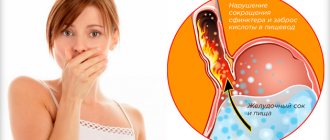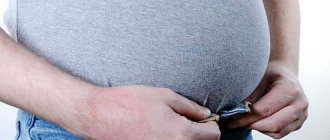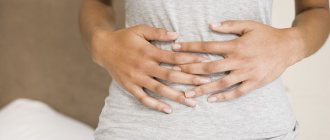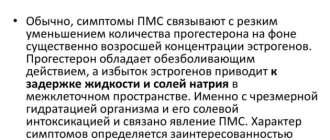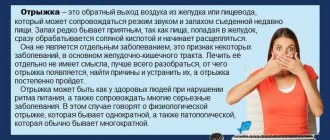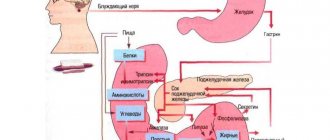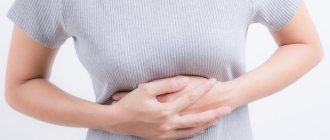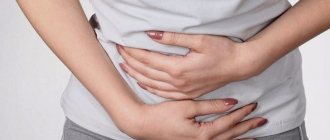Gases can gradually build up in the stomach area, leading to bloating and belching. Bloating and burping are two possible symptoms of indigestion, and they often occur together.
The active process of gas formation can lead to swelling or distension of the stomach due to pressure on its walls from the released gases.
Burping is the simplest and most effective tool for relieving this pressure. Without burping, gas must pass through the digestive tract on its own, which can be an inconvenient and sometimes painful process.
Bloating and air belching have a large number of possible causes. It is important to identify the causative factors of belching and flatulence.
This will allow for proper treatment of a specific disease in the gastrointestinal tract and get rid of various manifestations of indigestion.
Emergence
Probably, many of us notice that belching and bloating are observed after heavy holidays, accompanied by eating a large amount of food.
Abdominal pain can also occur after eating unusual and difficult to digest foods. It is necessary to note that the accumulation of gases in the gastrointestinal tract can occur for the following reasons.
Causes of belching:
- Errors in nutrition when a person eats dry food (in this case he cannot avoid flatulence). The same thing happens in the body if you allow significant breaks between meals.
- Poor chewing of food and hasty swallowing rapidly increases gas formation in the stomach.
- Simultaneous consumption of incompatible foods. For example, the appearance of flatulence and heartburn is facilitated by the consumption of salty and sweet foods, dairy products and vegetables at the same time. Diarrhea often develops from these combinations.
- The presence of parasites in the gastrointestinal tract (giardia, trichomonas, etc.).
- Quick conversations (if a person is talking on the phone, he may swallow air). This causes gases to enter the stomach and intestines.
- Eating large amounts of chewing gum. It causes increased gas formation and increased production of gastric juice. The acid formed during these processes corrodes the gastric mucosa, which causes heartburn and nausea.
Diagnostics
First, a simple x-ray examination is performed. The optimal time for it is when symptoms appear.
It can determine the cause of the distension, since large amounts of air can be easily detected within certain parts of the gastrointestinal tract.
To determine the ability of the stomach to empty its contents, a gastric evacuation study is performed.
For this purpose, food with a reactive substance is given. An apparatus is placed in the stomach that allows you to see the size of the organ and determine how processes occur. If a radioactive substance is retained, ultrasound and nuclear magnetic resonance are additionally prescribed.
Additionally, breath tests are carried out to determine the level of hydrogen and methane. The most convenient way is to determine the rapid growth of bacteria. Poorly digestible sugar is taken for research. When it reaches the intestines, the bacteria produce hydrogen or methane, which is absorbed into the blood.
Flatulence: accumulation of gases in the intestines
People with a completely healthy digestive tract can feel bloating and heartburn an hour after eating. The gastrointestinal tract is a cavity divided into three parts: the esophagus, stomach, and intestines.
Each part has its own environment, which ensures the normal process of food digestion:
- in the esophagus it is alkaline;
- in the stomach – sour;
- in the intestines - slightly alkaline.
Sphincter valves, located at the boundaries of the gastrointestinal tract, prevent the contents of neighboring sections from contacting in order to prevent the interaction of alkali with acid. If the aggressive environment of the stomach is nevertheless thrown into the alkaline environment of the esophagus or intestines, their mucous membrane becomes inflamed. Inflammation of the lining of the esophagus is called esophagitis, and inflammation of the duodenal mucosa is called bulbitis.
When the cardiac (gastroesophageal) sphincter between the esophagus and stomach is weakened, heartburn appears. The return (reflux) of acidic food back into the esophagus causes a neutralization reaction to begin, releasing heat.
The mucous membrane of the esophagus cannot protect its walls from the effects of heat and aggressive gastric juice - a burning sensation occurs behind the sternum. Reflux of food is accompanied by the movement of air from the stomach back to the esophagus - belching occurs.
First of all, when such symptoms appear, you need to find out what is causing the heartburn.
The return of food from the stomach can occur with increased pressure on the stomach, which is facilitated by:
- tight clothing, tight belt or corset;
- bending forward, lifting weights immediately after eating;
- horizontal position of the body after eating, making it difficult for the food bolus to move downwards;
- overeating and fullness of the stomach with food;
- hasty snacks, swallowing air while eating (aerophagia).
In women, carrying a child, especially in the 3rd trimester, is accompanied by frequent bloating and heartburn, as the fetus puts pressure on the stomach and interferes with digestion.
A side effect of many medications is a burning sensation in the chest:
- products containing theophylline (for the treatment of asthma);
- adrenaline blockers (for blood pressure);
- nitrates (for heart failure);
- hormonal drugs (Progestin, Thyroxine);
- tricyclics - drugs against depression;
- sedatives;
- nonsteroidal analgesics and antispasmodics (Nimesulide, Diclofenac).
Heartburn is caused by the abuse of certain foods: some promote the secretion of large amounts of gastric juice, others relax the gastroesophageal sphincter. Eating acidic foods leads to esophagitis, which develops with regular consumption:
- alcohol;
- coffee, tea;
- fatty and spicy foods, fast food;
- bakery and confectionery products, chocolate;
- Coca-Cola, sparkling water.
If, after eliminating these factors, the burning sensation in the esophagus after eating does not stop, then you should consult a doctor and find the cause of the pathology.
Gases move through the gastrointestinal tract along with food - this is a normal physiological process.
Air is present in the upper part of the stomach in the form of a bubble. Hurrying, talking, laughing while eating, we are able to swallow up to 1 liter of air, which then comes back in the form of belching or hiccups, which can carry food away from the stomach and provoke heartburn.
In the small intestine, acidic food from the stomach interacts with the alkaline environment of bile and pancreatic enzymes. The reactions are accompanied by the formation of intestinal gases: some of them are absorbed into the blood, and the other part moves into the colon. Painless gurgling in the abdomen is a manifestation of reactions in the small intestine.
The processing of the food bolus in the colon is completed. Here, beneficial saprophytic bacteria feed on food residues, mainly fiber. Their waste products (hydrogen, methane, carbon dioxide) are excreted along with feces. Normally, gas is released from the body up to 15 times a day, approximately 200 ml of gases are released, which do not have a pronounced stench.
When poorly digested food enters the rectum, pathological flora begins to develop, which causes increased gas formation - flatulence.
Products of pathogenic microbes (sulfur dioxide, ammonia, indole, skatole) in the form of foam overwhelm the intestines, indigestion is accompanied by constipation or diarrhea.
Sometimes up to 3000 ml of gases accumulate in the intestines, this causes the stomach to swell and hurt, gas separation is accompanied by a stench, and its frequency increases tens of times.
With healthy digestion, increased gas formation can occur for several reasons.
Binge eating
The gastrointestinal tract is capable of processing a certain amount of food at one time. If more of it is supplied, food is retained first in the stomach, the small intestine lacks bile and enzymes to process it, and as a result, poorly digested rotting food enters the small intestine - a breeding ground for pathogenic bacteria. Eating before bed has the same effect.
- All types of cruciferous vegetables (cabbage, radishes, radishes) are rich in healthy fiber, but contain sulfur. It inhibits saprophytes - bacteria that provoke flatulence develop instead.
- Legumes (peas, beans, lentils) contain vegetable protein, which is difficult to break down and enters the rectum insufficiently processed, which leads to flatulence.
- Products with coarse fiber (raw vegetables and fruits) - consuming them immediately after meals speeds up the movement of the main food through the digestive tract; it enters the large intestine poorly digested.
- Individual intolerance to dairy products: due to a lack of lactose, milk is not digested and causes flatulence.
Other reasons
Taking antibiotics and other medications for a long time disrupts the balance of microflora in the intestines; pathogenic flora suppresses beneficial bacteria and causes flatulence.
Its cause may be stress: nervous overload is accompanied by the release of adrenaline, which accelerates intestinal motility, so food does not have time to be digested well.
Flatulence is one of the signs of irritable bowel syndrome.
The nutritional factor - overeating, irrational diet, abuse of certain foods - causes irritation of the esophagus at the very beginning of food digestion and flatulence at the end of this process. If the causes of heartburn and bloating are not addressed in a timely manner, they will become symptoms of diseases of the digestive tract.
Regular attacks of heartburn and flatulence are an indicator of pathology in some part of the digestive tract. Adequate treatment is possible only after consultation with a gastroenterologist, who will establish the correct diagnosis. Constant heartburn is caused by diseases of the esophagus, stomach, and gallbladder:
- Pathologies of the esophagus: inflammation of the mucous membrane, polyps, hiatal hernia, gastroesophageal reflux disease.
- Gastritis with a high acid content in the stomach is most often caused by the proliferation of the Helicobacter microbe, which provokes erosion and the development of gastric ulcers.
- Cholecystitis, gallstones, and obstruction of the bile ducts provoke heartburn with bitter belching and a taste of bile.
Bloating is a consequence of pathologies of the intestines, pancreas, and stomach:
- Duodenitis (inflammation of the duodenum), colitis and enterocolitis, intestinal parasites, intestinal obstruction - make it difficult to digest food, it rots and gives impetus to the development of pathogenic bacteria.
- Pancreatitis - inflammation of the pancreas - disrupts the flow of enzymes amylase, lipase, trypsin into the intestines, which makes it difficult to break down carbohydrates, especially fats and proteins.
- Atrophic gastritis creates a deficiency of gastric juice - this leads to rotting of undigested food in the gastric tract and increased flatulence.
Gastrointestinal diseases require complex treatment, only then can you forget about heartburn and bloating.
To get rid of unwanted symptoms, you need to adjust your diet, give up bad habits and choose medications against heartburn and flatulence. If gastrointestinal pathologies are identified, they undergo a course of specialized treatment.
Diet
Treatment of heartburn and flatulence should begin with simple rules of eating:
- eat as often as possible and in small portions; Do not overeat under any circumstances, get up from the table with a slight feeling of hunger, which soon passes;
- do not eat in a hurry or on the go;
- do not have dinner before bed, do not go to bed immediately after eating;
- follow the order of food intake: first liquid dishes, then vegetables, then protein foods;
- do not eat raw vegetables and fruits immediately after the main meal;
- do not wash down fatty foods with water;
- regularly (once a month) arrange fasting days to cleanse the intestines;
- Drink a glass of raw water between meals.
While a burning sensation in the chest or attacks of flatulence appear after eating, you should avoid the following foods:
- coffee, chocolate, cocoa;
- mayonnaise, mustard, ketchup;
- fatty pork, lamb, duck;
- tomatoes, cabbage, beans, peas;
- onion garlic.
Diet for the treatment of bloating and heartburn recommends:
- have breakfast with cereals - carbohydrate foods with a lot of fiber are good for the intestines and keep you feeling full for a long time;
- dine on protein foods (fish, meat) in combination with vegetables;
- for an afternoon snack, eat a vegetable or fruit dish;
- for dinner - protein foods, eggs, dairy products, cheese.
Eating seeds (flaxseed, sunflower, pumpkin) helps with heartburn and flatulence. To prevent these symptoms, it is necessary to stop smoking, reduce alcohol consumption, and increase physical activity. It is very important to start fighting overeating and extra pounds, since obesity is always accompanied by digestive problems.
For acute attacks of heartburn and flatulence, medications with different mechanisms of action are indicated.
Antacids
Antacids neutralize hydrochloric acid that has entered the esophagus, act for 2 hours, relieve symptoms of burning, nausea, and belching:
- Gastacid, Amagel, Phosphalugel - aluminum-based drugs relieve heartburn, but cause constipation;
- Rutacid, Rennie - contain magnesium, side effect - diarrhea.
Heartburn remedies such as antacids should not be used uncontrollably: this will disrupt the water-salt balance and mineral metabolism in the body.
Drugs in this group suppress the secretion of gastric juice, heartburn attacks are relieved for 8 hours:
- proton pump blockers: Omez, Omeprazole, Rabeprazole, Esomeprazole - help relieve heartburn and heal inflamed areas of the esophageal mucosa;
- Histamine H2 receptor blockers: Ranitidine, Famotidine.
What should I do?
If a person experiences constant abdominal pain or cramps in the intestines for several hours after eating, then it is necessary to notify the local doctor or gastroenterologist. As a rule, with such symptoms, the treating consultant prescribes laboratory blood tests, abdominal and ultrasound examinations of the abdominal cavity. The results obtained allow us to determine whether the digestive tract is healthy and whether parasites are present in it.
It should also be remembered that excessive gas may be the first sign of digestion and absorption disorders, and bloating may be a sign of pancreatic enzyme deficiency, intestinal inflammation and/or cysts, as well as celiac disease, a multifactorial digestive disorder.
If diagnostic tests do not confirm the presence of systemic gastrointestinal diseases, then a common source of the problem is poor nutrition.
Heartburn, bloating and belching: causes, treatment, diet
Heartburn and bloating, stomach pain also appear as a result of the following predisposing factors:
- constipation, which causes symptoms of bloating and belching of air;
- insufficient physical activity;
- allergic reactions to certain foods;
- smoking (this often causes stomach pain);
- nervous tension (they can cause increased accumulation of gases in the stomach);
- defects in the structure of the gastrointestinal tract (they make it much more difficult for gases to pass away, which is why bloating occurs);
- frequent disruptions in bowel function;
- liver disease (this causes not only heartburn and bloating, but also belching with an unpleasant smell of rotten eggs).
After eating, some people may experience belching, an unpleasant feeling of fullness in the abdominal cavity.
Let's look at how bloating and air belching manifest themselves, the causes and treatment of this condition and its complications.
Despite the fact that such symptoms occur very often, they should not be ignored: bloating, belching are symptoms that indicate that a person has digestive problems.
Emergence
- Errors in nutrition when a person eats dry food (in this case he cannot avoid flatulence). The same thing happens in the body if you allow significant breaks between meals.
- Poor chewing of food and hasty swallowing rapidly increases gas formation in the stomach.
- Simultaneous consumption of incompatible foods. For example, the appearance of flatulence and heartburn is facilitated by the consumption of salty and sweet foods, dairy products and vegetables at the same time. Diarrhea often develops from these combinations.
- The presence of parasites in the gastrointestinal tract (giardia, trichomonas, etc.).
- Quick conversations (if a person is talking on the phone, he may swallow air). This causes gases to enter the stomach and intestines.
- Eating large amounts of chewing gum. It causes increased gas formation and increased production of gastric juice. The acid formed during these processes corrodes the gastric mucosa, which causes heartburn and nausea.
The cause of sharp cramping pain, a feeling of fullness and heaviness in the abdomen is often the accumulation of intestinal gases. Increased gas formation in the cavity of the digestive tract, causing bloating and belching, in most cases is a consequence of nutritional errors, but can also be a symptom of a number of diseases of the digestive system.
What is the power of the stomach?
The main function of gastric digestion is to prepare proteins for their complete digestion in the intestines. And the acidity of gastric juice is the main indicator of the activity of gastric digestion.
The nature of digestion in the stomach depends on the rate of evacuation of food from it. The release of gases into the esophagus and then into the oral cavity is called belching. The main cause of belching is stagnation of food and its decomposition with the release of gases.
The activity of gastric digestion also depends on the muscle tone of the stomach, the main purpose of which is reliable coverage of the food mass.
Relaxation of the gastric muscles limits the speed of food movement and stimulates putrefactive processes and gas formation.
Causes of food stagnation, causing flatulence and belching:
- violations of the motor and secretory functions of the stomach and intestines;
- Esophageal diverticulum is a congenital defect of the esophageal wall in the form of a pocket;
- intestinal infections;
- intestinal parasites;
- intestinal obstruction;
- consequences of surgery that limit the amplitude of peristaltic waves (adhesions, intestinal resection);
- lesions of the autonomic nervous system of the peritoneum;
- disorders of the intestinal microflora (including changes in eating behavior, taking a number of medications);
- mental trauma, strong emotional arousal, feverish states.
Stagnation of food can be caused equally by both increased and decreased acidity of gastric contents.
"Gate Guardian"
The length of time food stays in the stomach directly depends on the condition of the pylorus (lower valve) of the stomach, which acts as its exit “gate.” The muscle tone of the pylorus depends on the acidity of the food: the higher it is, the more securely the stomach is “locked.”
The reason for food retention in the stomach can be:
- persistent pyloric spasm;
- narrowing of the pylorus due to its compression by a tumor, the presence of scars or ulcers;
- atony (muscle weakness of the stomach walls).
Weakening the pylorus facilitates the backflow of bile, duodenal juice (duodenal secretion) and resulting gases, causing belching.
Stomach acid deficiency leads to the fact that food digestion begins to occur mainly in the intestines. Under these conditions, the digestion of muscle fibers is disrupted, the processes of anaerobic putrefaction intensify, and the feces acquire a putrid fetid odor, sticky consistency and stickiness.
Excessive acidity of food simply “locks” the pylorus, also leading to prolonged retention of the food bolus in the stomach and its bacterial decomposition. The breakdown products are, among other things, gastric gases (carbon dioxide, methane and hydrogen sulfide). The pressure created by accumulated gases can overcome the tone of the lower esophageal sphincter, the entrance “gate” of the stomach.
Stagnation of food causes irritation of the walls, pain and inflammation of the mucous membranes, and a feeling of abnormally rapid satiety.
Intense gastric digestion also causes weakening of intestinal digestion and intestinal sluggishness, provoking intoxication phenomena.
An enlarged stomach puts pressure on the nerve plexuses of the abdominal cavity, which are functionally important, and the intestines, reducing its peristalsis.
Increased motor activity of the stomach is replaced by its relaxation (atony), muscle weakness and expansion, which further slows down the evacuation of food. Prolapse of the stomach sometimes leads to atony.
The fundamental difference between the lower sections of the gastrointestinal tract and the upper sections is the presence of microbial flora and their excretory function. Disturbances in their balance affect not only the functioning of the intestines.
In conditions of pathology of excretory (excretory) function (constipation or diarrhea), intestinal microflora, the synthesis and absorption of various substances in the intestinal wall, for example, proteins and fats, is disrupted, which harms the nutrition and metabolic processes of the whole organism.
Intestinal gases are popularly delicately called winds, and bloating of the intestines from excess gas formation is medically called flatulence. The presence of gases in the intestine is due to its normal physiology and the results of the vital activity of the microorganisms inhabiting it.
Even under physiological conditions, the breakdown of carbohydrates by intestinal enzymes causes a slight “fermentation” effect.
But intestinal pathologies make it more pronounced, sharper, and protein foods in conditions of enzyme deficiency simply undergo rotting.
Inflammatory processes in the mucous membranes stimulate the secretion of mucus along the entire length of the intestine, changing its inherent properties. In the small intestine, this is expressed in a change in the quantity and quality of enzymes secreted into its lumen, and in impaired absorption of digestive products, salts and water.
Conditions for normal intestinal digestion are the timely supply of pancreatic juice and bile.
Gastric juice and bile acids have pronounced disinfectant properties.
Bile production may be reduced as a result of liver failure. Gallstone disease and/or diseases of the biliary tract also lead to bile deficiency.
The absence or insufficient flow of bile into the duodenum causes the growth of pathogenic bacterial flora, which is not restrained by the bactericidal properties of bile. As a result, the processes of food decomposition increase, gases accumulate, increasing the volume of the intestine and causing stretching of its walls, intestinal motility is disrupted, and the feces become compacted, which causes constipation.
The processes of normal digestion are due to the close relationship and coordination of the work of various parts of the gastrointestinal tract through nervous regulation: the secretory activity of the stomach affects the function of the intestines. For normal intestinal secretory activity, it is extremely important that the food mass is properly digested and prepared in the stomach.
The causes of intestinal digestion disorders are:
- disturbances in the activity of the central nervous system and nerves that “weave” the peritoneum and ensure intestinal function;
- inflammatory processes of the intestinal walls;
- gastric secretion disorder;
- disorder of pancreatic juice secretion;
- lack of bile;
- ulcerative lesions and intestinal tumors.
Inflammation of the large intestine impedes the absorption of nutrients and its motility. In general, the secretory, motor and absorption functions of the gastrointestinal tract are closely intertwined: pathological disorders of secretion entail changes in motor functions, and vice versa.
The process of formation and compaction of feces occurs in the large intestine. Constipation is the most common cause of bloating, general lethargy and lack of appetite.
Inflammatory processes make the intestinal wall permeable to both bacteria and intestinal poisons.
Self-poisoning manifests itself with greater force if the barrier role of the liver and the excretory capacity of the kidneys are weakened. With constipation, such autointoxications become chronic. Sluggish peristalsis creates conditions for inflammatory processes, the entry of rotting products and even pathogenic bacteria into the blood.
Treatment approaches
Treatment of flatulence requires an integrated approach. Only a complete examination of the patient makes it possible to establish the type of acidity that determines treatment tactics. During a detailed conversation, the doctor determines the presence of chronic diseases and additional symptoms, analyzes the patient’s lifestyle and diet, and his individual reactions to certain foods and medications.
Note! Enemas at home are ineffective: the volume of water that enters the intestines irrigates only a small area of the colon. Regular enemas wash away beneficial intestinal bacteria and only complicate the course of the disease.
Symptoms
When it becomes more and more difficult to hide a burp, it is worth considering whether it is time to see a doctor. There are a number of warning signs that should not be ignored:
- the appearance of heartburn, prolonged dry cough without signs of a cold, sore throat, nasopharynx;
- a clear putrid odor from the mouth, the appearance of a new metallic, bitter or sour taste;
- ingestion of small food particles with gases;
- the appearance of belching every time you bend or strain your abdominal muscles;
- the appearance of blood or pain due to belching.
Constipation is usually accompanied by intestinal colic of varying severity.
Compaction of intestinal contents significantly complicates the normal passage of both gases and feces. Against this background, many complications arise. Flatulence and hemorrhoids become an inevitable accompaniment of constipation.
Intestinal obstruction can be both a cause and a consequence of constipation. Complete or partial, it occurs due to mechanical narrowing of the intestinal lumen as a result of postoperative adhesions, tumors or deformation of the intestinal walls. It is always accompanied by periodic sharp pain, which is not relieved by conventional antispasmodics. Sooner or later, the “blockage” of the intestines ends sadly.
Causes of belching and bloating, methods of treatment and prevention
Belching is the body's natural process of expelling excess air from your stomach.
In most cases, a person does not pay attention to the beginning of the process of increased gas formation. Symptoms appear gradually, but then accompany all the time. While the signs “gain strength,” the person himself gets used to the symptom of bloating over time. After all, it passed on its own before, and now it will pass. Many people think so.
However, in some cases, belching and exhaust gases begin to bother you constantly.
And this already indicates that the developing pathology has “gained strength.” After this, it is impossible to fight it without medical help.
Physiological reasons for the appearance of such symptoms include:
- Irrational menu. Eating incompatible foods together. This forces the digestive organs to create priorities when processing them. In this case, complex chemical reactions occur, due to which gas formation occurs along with belching.
- Binge eating. In order to process a large amount of food, the body must synthesize additional amounts of enzymes. However, they do not have time to be produced. In this case, the food lump lingers in the stomach. This, in turn, causes pain in the abdomen when it is bloated and diarrhea.
- Excessive consumption of drinks containing gases. This addiction leads to the fact that a person often burps, while at the same time the carbon dioxide remaining inside the stomach provokes the fermentation process.
- Eating food very quickly. Such a meal leads to excessive swallowing of air. This manifestation has received its own name in medicine - aerophagia.
- Predominance of gas-forming products in the diet. The constant presence of cabbage, lamb, fresh baked goods, radishes and legumes in the menu leads to flatulence.
- Eating on the run, quick snacks, especially fast food products, lead to poor absorption of the food eaten.
- Bad habits. Not only alcohol, drunk frequently and in large quantities, has a negative effect on the stomach. Smoking is also harmful. Smoke has a bad effect on blood circulation, while stimulating additional production of gastric juice in the stomach. This leads to the development of gastritis and belching.
Personal intolerance to individual components included in food also leads to belching and bloating. Some fruits or vegetables, cereals or dairy products can contribute to this manifestation. Quite often, belching, gas formation and bloating are observed in women during pregnancy. Such difficulties in digesting food are manifested due to the following factors:
- During pregnancy, additional progesterone is produced in large quantities. This female sex hormone has an effect on reducing motility of both the stomach and intestines.
- The growth of the uterus leads to additional pressure on neighboring organs. Because of this, gases are retained in the stomach.
- Pregnant women change their food preferences, and in some cases quite dramatically. Unusual food leads to belching of air and nausea.
Small children often suffer from flatulence. In infants, the enzymatic system and digestive organs are not fully formed. Because of this, frequent belching occurs, the stomach bloats, constipation occurs, or loose stools occur.
When bottle-fed, the baby takes in a lot of air due to the large hole in the nipple. This causes belching, and in some cases, bloating. Intolerance to certain chemicals included in the mixtures can also lead to this result. The baby may burp due to the presence of lactulose or maltose in artificial nutrition. These same substances cause bloating as a result of intolerance.
We recommend reading: Why does a baby’s stomach growl and gurgle?
Diseases
Constant bloating and gases can be observed with the following pathologies:
- Anatomical defects. These may be congenital problems with the development of both the esophagus and pathologies identified in the stomach. Among them there are such defects as narrowing of the lumen at the outlet of the stomach, kinks or hernia. Such anatomical abnormalities in the human body can lead to a frequently growling stomach. This occurs due to the fact that a lot of gases accumulate in the stomach cavity.
- Pathologies associated with dysfunction of the stomach or esophagus. This can be either improper peristalsis, leading to a slowdown in the movement of the food bolus, or an increase or decrease in the acidity of gastric juices. Sour belching is often a symptom accompanying the development of ulcers in the stomach. With a lack of hydrochloric acid produced, the food bolus stagnates. In this case, the belching may have a putrid odor.
- Impairments in the functioning of the liver, as well as the gallbladder, as its component. Without the normal functioning of these organs, a complete digestion process is impossible. They secrete certain enzymes into the duodenum, where almost the final digestion of any food occurs. Excessive production of bile leads to belching with a bitter taste. In this case, nausea with the urge to vomit is possible.
- Malfunction of the duodenum or pancreas. Inflammatory processes in these organs (duodenitis or pancreatitis) lead to belching, and abdominal pain may appear.
- Disturbances in the functioning of the small or large intestine. These organs perform complete absorption of nutrients and fluids and remove waste residues from the body. Violation of their activity leads to an imbalance of microflora and belching with unpleasant odors.
- Cancerous tumors. Malignant neoplasms lead to the creation of an obstruction in the stomach; food and water pass through with difficulty and slowly. This leads to belching, nausea, and often vomiting.
Any failures listed above can only be identified after visiting a doctor and conducting a comprehensive examination.
We advise you to read: What causes belching with heaviness in the stomach after eating
"Gate Guardian"
If heartburn and bloating occur simultaneously or with a short time interval, then there is a high probability that there is a disease in the body.
Smoking and alcohol abuse are addictions that negatively affect the stomach. Once inside, harmful substances provoke inflammation, which leads to inadequate digestion of food and the appearance of flatulence.
Other lifestyle reasons:
- Overweight. Constant overeating provokes stretching of the stomach walls and weakening of the gastric sphincter, due to which food is thrown back into the esophagus. Obese people also suffer from belching and poor digestion of food.
- Abuse of pills. Most drugs increase the level of stomach acidity, especially Aspirin, Ortofen, Ibuprofen, Venarus, and provoke heartburn.
- Wearing restrictive clothing. Tight belts, corsets, uncomfortable suits are unfavorable factors that worsen digestion.
- Sleep after eating. Nutritionists do not recommend taking a horizontal position after eating: the risk of food reflux into the esophagus increases sharply.
- Warning. Heavy smokers and alcohol drinkers are more likely to experience stomach ulcers and heartburn.
Those suffering from heartburn should pay special attention to nutrition and their state of mind.
Poisoning and heartburn
Most often, a burning sensation in the stomach occurs after ingesting harmful substances that come along with pesticides, counterfeit alcohol, acids, alkalis or spoiled foods. After such poisoning, belching is combined with vomiting, with the help of which the body tries to get rid of dangerous substances.
In such a situation, enterosorbents should initially be taken in large quantities, and only then medications for heartburn and fermentation in the stomach should be taken. In case of severe intoxication, hemosorption or forced diuresis will be required.
Nutrition factor
Even if you exclude harmful foods, causes of heartburn and bloating can be caused by eating disorders. Eating food on the go, a tendency to overeat at night, irregular meals, frequent diets are conditions for the development of malfunctions in the gastrointestinal tract. Healthy eating advocates require choosing the traditional rhythm of meals - breakfast, lunch and dinner.
The predominance of conditionally pathogenic microflora in the intestine influences the increased activity of microorganisms that enhance the release of hydrogen, methane, carbon dioxide, which produce gas formation.
With severe dysbiosis, a person experiences all the signs of intoxication, including heartburn and vomiting. Probiotics are effective preventive and therapeutic agents: Linex, Bifidumbacterin and their analogues.
Microflora can also be restored by consuming fermented milk products.
The meaning of stress
Neurotic conditions are dangerous due to increased release of hydrochloric acid into the stomach under the influence of stress factors.
The lack of food at this moment is associated with a strong negative effect on the stomach - its surface becomes inflamed, and the intestinal muscles go into a state of spasm.
The risk of developing heartburn and flatulence is highest during a tourist trip, during which the body enters unusual exotic food.
Proper digestion of food is also possible with sufficient production of enzymes by the pancreas.
A reduction in the supply of organic catalysts that break down complex carbohydrates and proteins leads to insufficient digestion of food, and the stomach begins to swell and increase in size.
Disorder of the functioning of an important organ can be provoked by excessive intake of junk food and addiction to alcoholic beverages.
Heartburn and gas - related diseases:
- pancreatitis,
- diabetes,
- pancreatic necrosis,
- jaundice,
- gland cyst.
Causes of Frequent Passing of Gas
Passing gas after bloating rarely appears in the morning. As a rule, they grow during the day and intensify in the evening. Determining the causes of bloating is not always easy. However, experts believe that the whole point is in the ingredients that have not been treated with digestive enzymes. The resulting chemical reaction contributes to the release of odorous gases, which consist of carbon dioxide, hydrogen, methane and nitrogen.
The air that comes in while eating and drinking provides an oxygen mixture that facilitates fermentation and increases the amount of gas produced. When there is too much of it in the stomach and intestines, bloating and excessive gas production occurs.
Diet
When belching and gas occur, nutritional correction is necessary. The following foods will have to be excluded from the diet:
- all legumes - they cause bloating and belching;
- heartburn and flatulence are caused by canned food and pickles;
- herring;
- seafood;
- fat meat;
- any cabbage;
- sweets;
- radishes, turnips, radishes, onions.
In case of belching and gas formation, it is necessary to add low-fat meat dishes from rabbit, veal, and chicken to the menu. It is useful to drink homemade yogurt and yogurt. It is recommended to add special spices to dishes to reduce gas formation and normalize stomach function: coriander, parsley, dill.
Experts recommend preparing dill water: this medicine normalizes the condition of the intestines and stomach, relieves pain and rumbling in the stomach.
Preventive measures
You can prevent flatulence and belching by leading an active lifestyle. It is necessary to walk in the fresh air every day; at any age it is useful to engage in physical exercise or sports.
A lot of attention needs to be paid to creating a daily menu. Fried foods and fast food should be excluded from the diet, and it is advisable to limit sweets and starchy foods.
If you have chronic diseases, you should not neglect the recommendations of doctors. It is necessary to undergo regular preventive examinations, and in case of exacerbations, do not self-medicate.
Bloating and belching often occur together. Typically, such symptoms appear sporadically and go away on their own without any special treatment. However, in some cases they are just a temporary inconvenience after eating. Such symptoms in adults may indicate serious problems with the digestive system.
What to do to avoid flatulence and increased gas formation?
First of all, you need to learn and follow a few simple rules of proper nutrition:
- You should eat small portions 4-5 times a day.
- To facilitate digestion processes. It is necessary to chew every piece of food thoroughly.
- Raw vegetables and fruits are recommended to be consumed in the first half of the day.
- All dishes must be heat treated, steamed or boiled.
- New foods should be introduced into the diet in small quantities to see how the body reacts to them.
- Avoid heated and artificially colored foods, as well as canned foods.
- If you smoke, you should not do this before eating.
What diseases can this indicate?
Chronic pancreatitis, manifested in the form of advanced inflammatory lesions of the pancreas; Irritable bowel syndrome manifests itself in the form of disturbances in the functioning of the digestive system. Causes intestinal spasms; Dysbacteriosis, which provokes a malfunction of the intestinal microflora. Bacteria and pathogenic microorganisms multiply in the gastrointestinal tract; Lactose intolerance, the severity of which depends on the level of enzyme deficiency; Stomach ulcer, in which the food in the stomach begins to decompose over time. Because of this, ammonia is released in the human body. Therefore, during belching, a very unpleasant bad odor begins to appear, similar to rotten eggs;
Gallbladder diseases
This manifestation is a consequence of diseases manifested in the form of nausea, bloating and severe heartburn. Such diseases include:
Biliary dyskinesia, which provokes a disorder in the contraction process of the gallbladder and its pathways. According to statistics, this disease most often occurs in women with hormonal imbalances and poor nutrition. In order to eliminate the disease, it is necessary to follow a gentle diet, take antispasmodics and choleretic drugs. Abnormal increase or decrease in size of the gallbladder, formation of an irregular shape. Enlargement of the organ indicates cholecystomegaly. This manifestation may be a consequence of sickle hemoglobinopathy. Organ shrinkage occurs in people with cystic fibrosis. With this disease, the bile becomes thick and viscous. Patients may experience protrusion of the organ walls outward, which is a consequence of the growth of diverticula. Another pathology is the formation of multiple septa, due to which the surface of the organ becomes lumpy. A very rare anomaly is the Phrygian cap, in which the organ bends upward. Chronic cholecystitis, manifested as inflammation of the walls of the gallbladder. The disease provokes motor-tonic disruptions of the biliary system. The disease can manifest itself in all age groups. Postcholecystectomy syndrome, which manifests itself after removal of the gallbladder. Patients experience recurrent pain attacks, dyspeptic disorders, steatorrhea, and hypovitaminosis.
